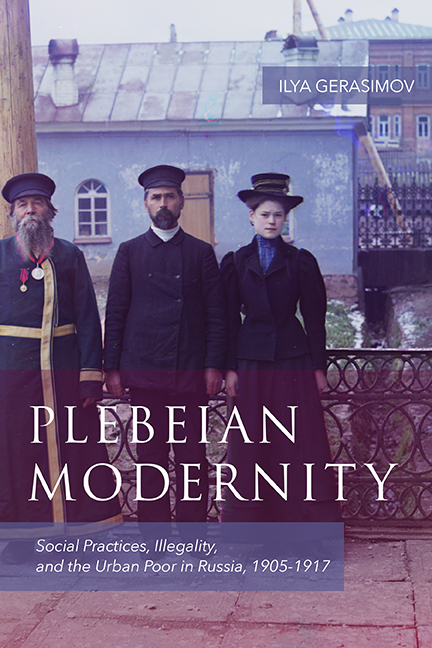Book contents
- Frontmatter
- Contents
- Acknowledgments
- Note on Editorial Conventions
- Introduction: The Subalterns Speak Out: Gerasim and the Infamous
- 1 Writing Degree Zero, and Beyond: Reading Social Practices between the Lines
- 2 The Middle Volga City as the Middle Ground: Urban Plebeian Society
- 3 The Patriarchal Metropolis: Trespassing Social Barriers in Late Imperial Vilna
- 4 “We Only Kill Each Other”: The Anthropology of Deadly Violence and Contested Intergroup Boundaries
- 5 The Transformative Social Experience of Illegality
- Epilogue: Gerasim in Power: A Plebeian Modernity
- Notes
- Selected Bibliography
- Index
4 - “We Only Kill Each Other”: The Anthropology of Deadly Violence and Contested Intergroup Boundaries
Published online by Cambridge University Press: 09 June 2021
- Frontmatter
- Contents
- Acknowledgments
- Note on Editorial Conventions
- Introduction: The Subalterns Speak Out: Gerasim and the Infamous
- 1 Writing Degree Zero, and Beyond: Reading Social Practices between the Lines
- 2 The Middle Volga City as the Middle Ground: Urban Plebeian Society
- 3 The Patriarchal Metropolis: Trespassing Social Barriers in Late Imperial Vilna
- 4 “We Only Kill Each Other”: The Anthropology of Deadly Violence and Contested Intergroup Boundaries
- 5 The Transformative Social Experience of Illegality
- Epilogue: Gerasim in Power: A Plebeian Modernity
- Notes
- Selected Bibliography
- Index
Summary
In Struggle You Will Find Your Rights!
Little affected by public discourses elaborated within patrician educated circles, Russian plebeian society employed the social practice of patriarchality when in a potentially explosive cultural and political environment of competing ethnoconfessional groups, and relied on the practice of creative misunderstandings of the middle ground to expand and stabilize the sphere of intergroup cooperation. The fundamental weakness of the hold of public discourses over plebeian society, and the latter's inability to use discourses systematically as a mediator of social relations and transactions resulted in the previously mentioned persistence of carnal knowledge (not constrained solely to the sphere of sexuality, as elaborated by Ann Stoler). Explicit social gestures conveyed much of the relevant information in the language of body politics. There was a darker side to this reliance upon nonverbal modes of communication, as the most intensive meaning could be cloaked in an act of violence, including deadly violence.
Long before action directe became associated with the name of a notorious French urban guerrilla organization in 1979, the principle of direct action became dominant in the sphere of Russian mass politics that was emerging during the first years of the twentieth century. “In struggle you will find your rights!” was the official slogan of the most popular and influential revolutionary party of Socialist Revolutionaries. Despite the efforts of the factions of Russian socialist parties that were better educated and integrated in the sphere of public discourses to rely on propaganda and political education of the masses, both Socialist Revolutionaries and Social Democrats regarded highly symbolical assassinations as the most efficient vehicle for popular mobilization. During the troubled years in the wake of the abortive 1905 Revolution, revolutionary terror overwhelmed the country. In 1906, 3,108 people were killed and wounded as a result of terrorist attacks, which averaged eight or nine casualties a day. Politics and politically motivated violence did not play a decisive role in the functioning of plebeian society, except for the periods of general strikes and armed uprisings. Rather, in their attempts to mobilize the urban lower classes for the revolution, radical political activists themselves had to intuitively rely on the language and social practices understandable to their target audience.
- Type
- Chapter
- Information
- Plebeian ModernitySocial Practices, Illegality, and the Urban Poor in Russia, 1906–1916, pp. 108 - 132Publisher: Boydell & BrewerPrint publication year: 2018



